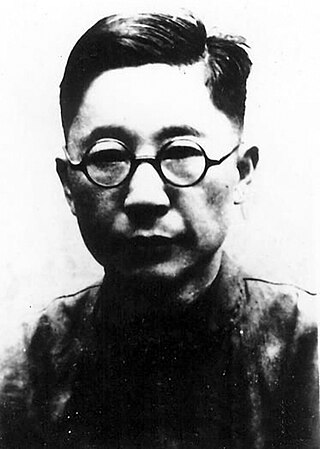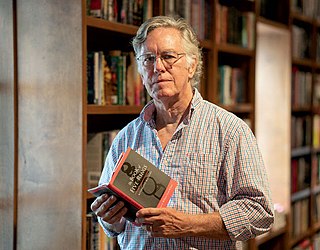
Aldous Leonard Huxley was an English writer and philosopher. His bibliography spans nearly 50 books, including novels and non-fiction works, as well as essays, narratives, and poems.

Shu Qingchun, known by his pen name Lao She, was a Chinese novelist and dramatist. He was a writer of 20th-century Chinese literature, known for his novel Rickshaw Boy and the play Teahouse (茶馆). He was of Manchu ethnicity, and his works are known for their vivid use of the Beijing dialect.

Hilary Whitehall Putnam was an American philosopher, mathematician, computer scientist, and figure in analytic philosophy in the second half of the 20th century. He contributed to the studies of philosophy of mind, philosophy of language, philosophy of mathematics, and philosophy of science. Outside philosophy, Putnam contributed to mathematics and computer science. Together with Martin Davis he developed the Davis–Putnam algorithm for the Boolean satisfiability problem and he helped demonstrate the unsolvability of Hilbert's tenth problem.

Zhuang Zhou, commonly known as Zhuangzi, was an influential Chinese philosopher who lived around the 4th century BCE during the Warring States period, a period of great development in Chinese philosophy, the Hundred Schools of Thought. He is credited with writing—in part or in whole—a work known by his name, the Zhuangzi, which is one of two foundational texts of Taoism, alongside the Tao Te Ching.

Kenzaburō Ōe was a Japanese writer and a major figure in contemporary Japanese literature. His novels, short stories and essays, strongly influenced by French and American literature and literary theory, deal with political, social and philosophical issues, including nuclear weapons, nuclear power, social non-conformism, and existentialism. Ōe was awarded the 1994 Nobel Prize in Literature for creating "an imagined world, where life and myth condense to form a disconcerting picture of the human predicament today".

The Constitution of the Chinese Communist Party has 55 articles and its contents describe the program of the party, as well as its organizational structure and party symbolism.
A philosophical zombie is a being in a thought experiment in the philosophy of mind that is physically identical to a normal human being but does not have conscious experience.
David Berlinski is an American mathematician and philosopher. He has written books about mathematics and the history of science as well as fiction. An opponent of evolution, he is a senior fellow of the Discovery Institute's Center for Science and Culture, an organization which promotes the pseudoscientic idea of intelligent design. Berlinski professes to be a skeptic about evolution, but he disavows belief in intelligent design.

Yi-Fu Tuan was a Chinese-born American geographer and writer. He was one of the key figures in human geography and arguably the most important originator of humanistic geography.

William Scott Wilson is known for translating several works of Japanese literature, mostly those relating to the martial tradition of that country. Wilson has brought historical Chinese and Japanese thought, philosophy, and tactics to the West in his translations of famous East Asian literature.
When a white horse is not a horse is a paradox in Chinese philosophy attributed to Gongsun Long, a philosopher of the Warring States period. It appears in the form of a dialogue between two unnamed speakers who debate the proposition "a white horse is not a horse".
Thomas Givon is a linguist and writer. He is one of the founders of "West Coast Functionalism", today classified as a usage-based model of language, and of the linguistics department at the University of Oregon. Givón advocates an evolutionary approach to language and communication.
Sven Ove Hansson is a Swedish philosopher. He is a professor of philosophy and chair of the Department of Philosophy and History of Technology at the Royal Institute of Technology (KTH) in Stockholm, Sweden. He is an author and scientific skeptic, with a special interest in environmental risk assessment, as well as in decision theory and belief revision.

Larry Feign is an American cartoonist and writer based in Hong Kong. Feign is best known for his comic strip The World of Lily Wong.
Robert L. Holmes is a Professor Emeritus of Philosophy at the University of Rochester, and an expert on issues of peace and nonviolence. Holmes specializes in ethics, and in social and political philosophy. He has written numerous articles and several books on those topics, and has been invited to address national and international conferences.

Mark Johnston is an Australian-born philosopher working at Princeton University.
The following is a list of works by philosopher Graham Priest.

Alan Richard White was an analytic philosopher who worked mainly in epistemology, the philosophy of mind, and, latterly, legal philosophy. Peter Hacker notes that he was "the most skillful developer of Rylean ... ideas in philosophical psychology" and that "if anyone surpassed Austin in subtlety and refinement in the discrimination of grammatical differences, it was White." Richard Swinburne remarks that "during the heyday of 'ordinary language philosophy' no tongue practised it better."
Dutch philosophy is a broad branch of philosophy that discusses the contributions of Dutch philosophers to the discourse of Western philosophy and Renaissance philosophy. The philosophy, as its own entity, arose in the 16th and 17th centuries through the philosophical studies of Desiderius Erasmus and Baruch Spinoza. The adoption of the humanistic perspective by Erasmus, despite his Christian background, and rational but theocentric perspective expounded by Spinoza, supported each of these philosopher's works. In general, the philosophy revolved around acknowledging the reality of human self-determination and rational thought rather than focusing on traditional ideals of fatalism and virtue raised in Christianity. The roots of philosophical frameworks like the mind-body dualism and monism debate can also be traced to Dutch philosophy, which is attributed to 17th century philosopher René Descartes. Descartes was both a mathematician and philosopher during the Dutch Golden Age, despite being from the Kingdom of France. Modern Dutch philosophers like D.H. Th. Vollenhoven provided critical analyses on the dichotomy between dualism and monism.










